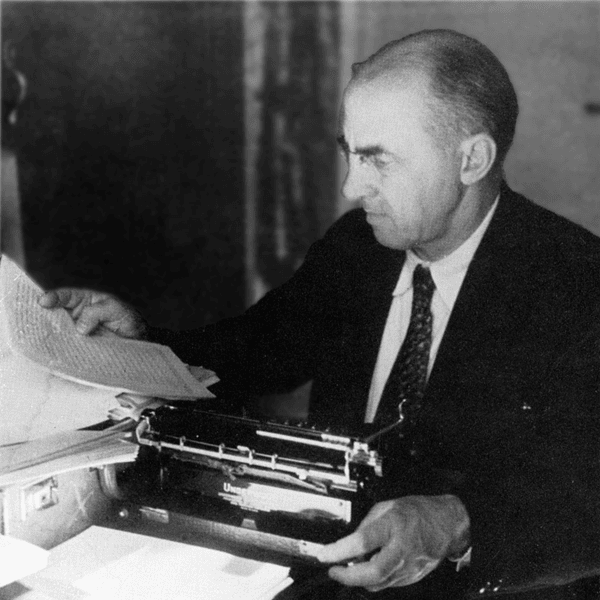Presidential Address
In Memoriam
From the American Historical Review 71:3 (April 1966)
Lynn Thorndike (July 24, 1882–December 28, 1965) was professor of history at Columbia University. Thorndike, a life member of the American Historical Association and its president in 1955, died in New York City on December 28, at the age of eighty-three. A graduate of Wesleyan, he received his doctorate from Columbia in 1905. After teaching at Northwestern and Western Reserve, he was called to Columbia in 1924 where he taught until his retirement in 1952. His textbook, The History of Medieval Europe, first published in 1917 and reappearing over the years in many successive editions, was influential in shaping the form and content of college courses in the subject. A Short History of Civilization, which appeared in 1926, in some ways a pioneer in the field, was a very direct product of Thorndike’s humanism. As he wrote in the preface, “when the World War broke out in 1914, I determined to do what little I could to keep civilization alive. This volume is a contribution in that direction.” That contribution was a “presentation of the main thread of the story of civilization between the covers of a single volume.” In this Short History, written forty years ago, the great cultures of the Far East were not omitted, but were treated “both per se and in their relations to the west.” Thorndike wrote that his History of Magic and Experimental Science had long been in preparation “ever since in 1902–1903, Professor James Harvey Robinson, when my mind was still in the making, suggested the study of magic in medieval universities as the subject of my thesis for the master’s degree.” To Thorndike magic and experimental science were connected in their development, and magicians were perhaps the first to experiment; and so he began his treatment with early man and carried it on, through successive volumes embodying the results of meticulous research, into the modern period. Numerous other books and monographs on various aspects of medieval science were written during a long and fruitful career of distinguished scholarship that received frequent recognition from learned societies and universities here and abroad.
Lynn Thorndike’s students, like the world of learning at large, recognized and honored his massive achievements in scholarship, but they remember him with special warmth and gratitude as the unfailingly generous and kindly director of their studies and molder of their careers.
Bibliography
Medieval Europe, its development & civilization. London & Sydney, G. G. Harrap & company ltd., 1920.
A history of magic and experimental science. 8 vols. New York: Macmillan, 1923-58.
The history of medieval Europe, by Lynn Thorndike. Rev. ed. Boston, New York: Houghton Mifflin Company, 1928.
Science and thought in the fifteenth century; studies in the history of medicine and surgery, natural and mathematical science, philosophy and politics, by Lynn Thorndike. New York: Columbia University Press, 1929.
A catalogue of incipits of mediaeval scientific writings in Latin, by Lynn Thorndike and Pearl Kibre. Cambridge, Mass.: Mediaeval Academy of America, 1937.
Traditional medieval tracts concerning engraved astrological images. Louvain: Bibliothèque de l’Université, 1947.
A short history of civilization, by Lynn Thorndike. 2d ed. New York: Appleton Century-Crofts, 1948.
The Sphere of Sacrobosco and its commentators. Chicago: University of Chicago Press, 1949.
Latin treatises on comets between 1238 and 1368 A. D. Edited by Lynn Thorndike. Chicago: University of Chicago Press, 1950.
The place of magic in the intellectual history of Europe. New York: AMS Press, 1967.
University records and life in the Middle Ages, by Lynn Thorndike. New York: Norton, 1975.
A guide to the study of medieval history, by Louis John Paetow; with errata compiled by Gray C. Boyce and an addendum by Lynn Thorndike; prepared under the auspices of the Mediaeval Academy of America. Rev. and corr. ed. Millwood, N.Y.: Kraus Reprint, 1980, 1917.
